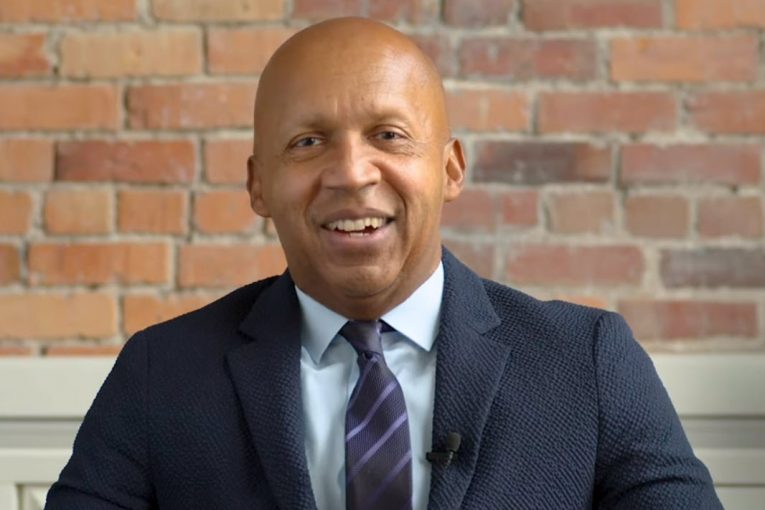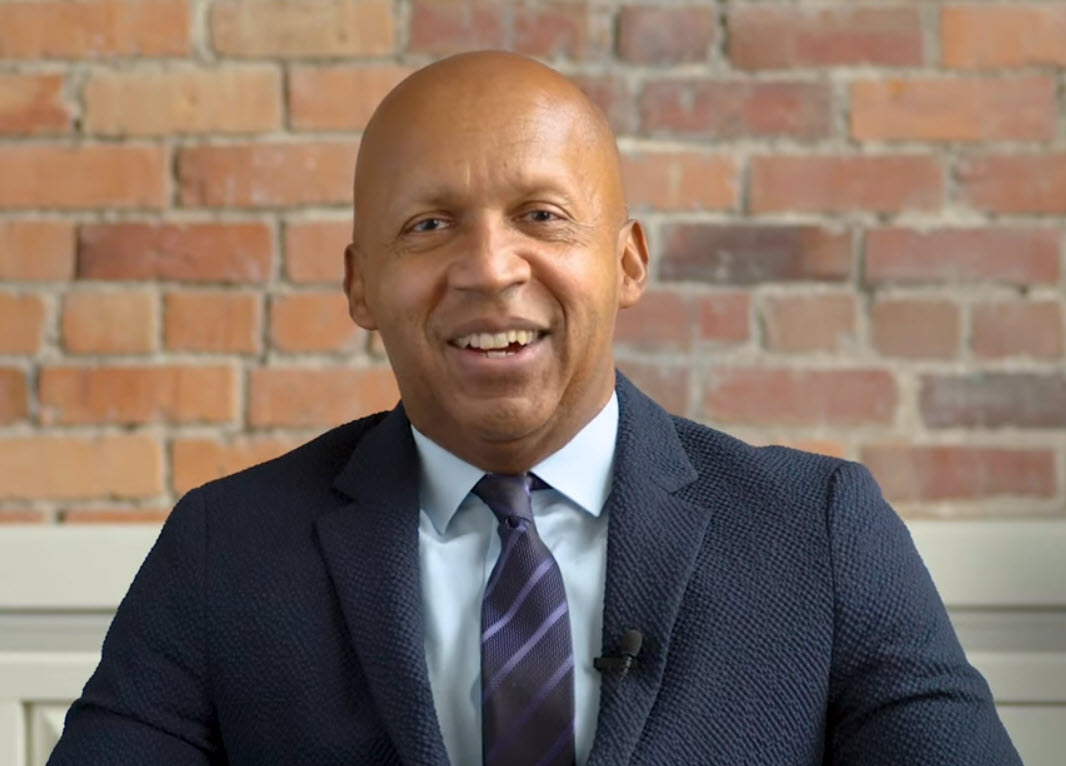

By Mia Machado
SAN FRANCISCO, CA – In this week’s season 2 premiere of “Chasing Justice,” co-hosts Rachel Marshall and San Francisco District Attorney Chesa Boudin explore the state of the criminal justice system, one year after the murder of George Floyd.
Joining them was special guest Bryan Stevenson, founder and Executive Director of the Equal Justice Initiative and the author of “Just Mercy.”
In this season of Chasing Justice, each episode is devoted to exploring discrete groups of people in the legal system, examining the system’s treatment of that group, and how the legal system can work better to serve them.
For their first episode, Marshall – the Director of Communications & Policy Advisor for the SF DA’s office – and DA Boudin invited Stevenson, often referred to as “America’s Nelson Mandela,” and widely recognized as one of the greatest lawyers of this time.
Stevenson is the founder and Executive Director of the Equal Justice Initiative (EJI) in Montgomery, Alabama. Under his leadership, EJI has won major legal challenges, including eliminating unfair and excessive sentencing, exonerating innocent people on death row, confronting abuse of the incarcerated and the mentally ill, and helping children prosecuted as adults.
Stevenson and his staff have won reversals, relief, or release from prison for over 135 wrongly condemned people on death row, and he has also argued and won multiple cases in front of the United States Supreme Court.
One of these cases was Miller v. Alabama, a landmark 2020 ruling that banned mandatory life imprisonment without parole sentences, for children 17 or younger.
Together, the three covered a powerful conversation about the importance of truth-telling and accountability on the road to achieving redemption and healing, and the role that prosecutors play in effecting that change.
To start off the episode, DA Boudin analyzed where the nation now stands in terms of the criminal justice system. He explained that the year 2020 “brought with it so much heightened awareness of the problems in our  legal system, particularly around race and policing.”
legal system, particularly around race and policing.”
Following the murder of George Floyd and Breonna Taylor, among many others, DA Boudin asserted that country saw “a national reckoning.” DA Boudin asked Stevenson what the response to those murders tells society about where it stands as a nation.
Stevenson said that it’s encouraging to see a broader recognition that the problem of racial inequality and the legacy of racial injustice—that we all inherited— is not a problem that will go away by itself.
He explained that no matter where you live in the country, “you’re living in a space that has been corrupted by our long history of racial inequalities—like smog in the air. Many people believe that at some point, “those toxins will just dissipate, and we’ll be fine.”
However, others argue that these kinds of contaminants will need to be cleaned from the environment. “They will not go away, and that legacy, that long legacy that we’re so silent about is continuing to compromise our ability to be healthy, safe, and just,” he explained.
To Stevenson, the graphic police violence of George Floyd’s murder and the continuing narratives of Ahmed Arbery and Breonna Taylor, just reinforce that there is “a presumption of dangerousness and guilt that burdens black and brown people in this country.”
“You can work in a prosecutor’s office, you can be a law professor, you can be a teacher, you can be kind, you can be loving, but if you’re Black or Brown you’re going to go places where you are going to be required to navigate this presumption of dangerousness and guilt,” Stevenson explained, and only now are people recognizing that this is unfair and unjust.
“Black folks have always known that, but now there’s a broader recognition,” he said. Despite this recognition, Stevenson believes that the real question is if now, something will be done about it.
Marshall mentioned that last season, “Chasing Justice” hosted Angela Davis, who asserted that 2020 was unlike any that she has ever seen, including the Civil Rights Movement of the 1960s. As almost a year has passed, Marshall asked if Stevenson sees any real lasting change, “as opposed to just lip service.”
Stevenson agreed with Davis, that there is awareness now that hasn’t been seen before. He explained that there used to be a “profound opposition towards activism” in the 1950s and 1960s, not seen in the summer of 2020.
However, Stevenson believes that the challenge is that “civil rights protests in Selma specifically, knew what they wanted— they wanted a voting rights act.” Dr. Martin Luther King knew that they wanted a Civil Rights Act in 1964, and the people in Montgomery in 1950 knew they wanted an end to racial segregation on buses.
This “clarity of the goal” and objective, “gave shape to those movements in ways that were really important,” said Stevenson, who thinks that this absence of clarity around a lot of what is seen now is a lot of what he worries about.
He explained that it’s important to demand that the U.S. government abolish the death penalty, end the misguided war on drugs, and deal with addiction and dependency as a health problem, rather than a crime problem.
He also emphasized that it’s important to take away procedural barriers to the claims of racial bias.
Stevenson called attention to the need to reform the passage in 1996 of the Anti-Terrorism Effective Death Penalty Act, that put a “very severe constraint on Habeas Corpus,” which he said in effect “sidelined the Federal Judiciary in being an active player.”
He asserted that the deference requirement in that law that required criminal judges to not correct constitutional violations in criminal cases, needs to be eliminated. Procedural bars like this one need to be voided if a claim of racial discrimination is presented in a criminal case.
Stevenson believes that these kinds of direct policy legal reforms are really important, and what is missing from this moment.
Passing policing reform bills such as ending qualified immunity, are things that Stevenson said will “ultimately tell us if it’s a moment, or a movement.”
DA Boudin, on the topic of the death penalty, said one of the things he is proud to have accomplished since being elected, was getting every last person on death row in California from San Francisco County, off death row, and get them a parole date.
“It’s such a critical area when it comes to the failings of our legal system and our moral framework for how we approach punishment and accountability,” DA Boudin said.
Shifting to the role of prosecutors, DA Boudin explained that he has approached prosecution differently than most DAs in the past, but he knows that DAs and their offices “play a massive role in creating mass incarceration, promoting the death penalty, in policies like trying juveniles as adults, in criminalizing poverty, in promoting even white supremacy.”
“So many problems that we see in our legal system have been promoted, caused, or perpetuated, at least in part by prosecutors. We have so much power and that power has been abused,” he said.
Given this reality, DA Boudin asked how prosecutors can reconcile the history of slavery in this country, and the way in which it led to a legal system that disproportionately targets and criminalizes particularly Black men.
Stevenson explained that it needs to be recognized that 95 percent of the prosecutors in the country are white men. “That means there’s an extra obligation to be attentive to these issues, to speak to these issues, so address these issues,” he said.
Stevenson explained that we haven’t focused on the fact that the “real burden” that we have to overcome is this narrative of racial difference, and he thinks we haven’t acknowledged it.
“The great evil of slavery wasn’t the involuntary servitude, it wasn’t the forced labor, it wasn’t the bondage, — that was horrific— but the real evil was the narrative that was created to justify and enslave them,” he said.
This false narrative is what Stevenson insists gave rise to white supremacy. It is a narrative not acknowledged, even in our legal systems.
Stevenson thinks that prosecutors have a role in modeling truth-telling. He said it’s necessary for prosecutors to acknowledge that many of the people who held their offices before them failed to protect people of color, and apologize for that.
“It doesn’t take a lot of money, it doesn’t take a lot of time, but what it represents is a kind of truth-telling,” he said.
Now that they hold these offices, Stevenson explains that they should make it clear that they are committed to protect and serve those marginalized communities they once hurt, so they can open the door to a new relationship with the community that was once victimized by their offices.
Marshall explained that as she and DA Boudin are both former public defenders, they think a lot about reimagining the criminal legal system. She asked Stevenson what accountability looks like that isn’t punishment.
Stevenson explained that if you’re really working with people who are struggling with addiction and dependency, most of them will tell you they hate their lives. So, accountability means “helping them get to a place where they can live the kind of lives of dignity and decency that they want.”
He said that people with trauma disorders do things that are violent and destructive, but that most of them hate what happened and wish they could change it. Accountability is helping people get back up when they’ve made a tragic mistake
He emphasized that “we’re all more than the worst thing we’ve ever done.” Justice requires understanding the other things that they are, other than the wrong doings they’ve committed. Only when we consider this, he explained, can we create a just solution.
“If it was caused by trauma, mental health, or bigotry, these are the things we need to deal with,” he said, “a multitude of responses would be a more effective way to eliminate further offending, than the single response that we use.”
DA Boudin explained that as he tries to serve the people of San Francisco, he tries to implement some of these policies to move toward redemption, and rely on truth-telling as part of the process to get there.
He admitted that it’s really easy in a place like SF for many of his constituents to get behind ending the death penalty or fighting to end wrongful convictions. But it’s harder to convince people that they should be “focusing on root causes of crime.”
He asked what Stevenson’s opinion was on the meaning of a progressive prosecutor in a place like San Francisco.
Stevenson said he believes that people want to live in communities that they feel safe. But he said that if we’re serious about doing something about public safety, then we first need to do something about the “epidemic of childhood trauma that leads to the behavior that often makes communities less safe.”
“If we truly want to bring the crime rate down, we need to intervene in the communities and the spaces where we know kids are born into violent families or living in violent neighborhoods,” Stevenson said.
He explained that it’s an investment to help make these kids feel safe, but that it’s rooted in bringing down the crime rate and improving public safety.
“It’s in everyone’s interest,” he said.
 Mia Machado is a junior at UC Davis, currently majoring in Political Science-Public Service and minoring in Luso-Brazilian studies. She is originally from Berkeley, California
Mia Machado is a junior at UC Davis, currently majoring in Political Science-Public Service and minoring in Luso-Brazilian studies. She is originally from Berkeley, California
To sign up for our new newsletter – Everyday Injustice – https://tinyurl.com/yyultcf9
Support our work – to become a sustaining at $5 – $10- $25 per month hit the link:




